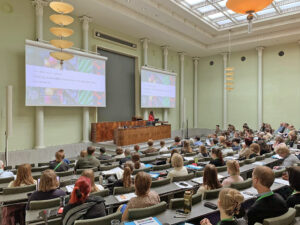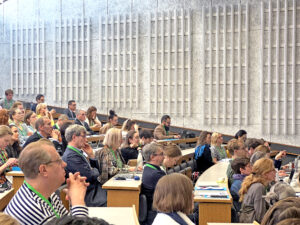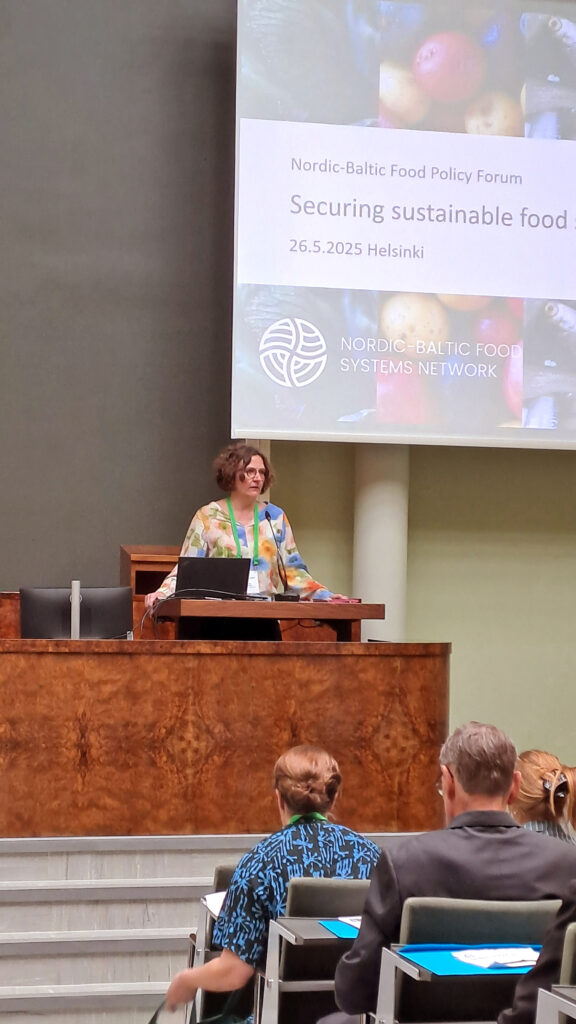For the first time, the “Nordic-Baltic Food Systems Conference and Policy Forum” (NFN2025) has been organised. The conference succeeded in its goal: to serve as a platform for meetings between researchers and decision-makers working towards more sustainable food systems.
Photo: Minna Kaljonen
In Helsinki, Finland, nearly 300 researchers, policymakers, and other stakeholders connected to food systems, gathered for the conference under the theme ”Securing sustainable food systems in turbulent times.”
– The aim was to dig deep into how the Nordic and Baltic countries can create resilient and sustainable food systems for the future together, in these geopolitically turbulent times, says Minna Kaljonen, coordinator and one of the organizers of the conference.
The key messages from the NFN2025 were delivered to the Nordic Council of Ministers meeting in Kuopio 11-12.6.2025. The organisers emphasized the need for strong institutional support for transdisciplinary food systems research and policy. They argued that the Nordic Council of Ministers could take a stronger role in breaking the siloed sectoral policies and prioritizing food systems research in research funding. The geopolitical turbulences underline the need to look for solutions that give multiple benefits.
Results seminar and policy forum
 The conference started with the results-seminar after a Finnish six-year long Food-program, funded by the Strategic Research Council Finland. Three transdisciplinary projects concentrating on just food systems transition (www.justfood.fi), legume value chains (www.leg4life.fi) and regenerative farming (https://www.bsag.fi/en/carbon-action-en/) showcased the solutions for building sustainable, climate-smart and healthy food systems.
The conference started with the results-seminar after a Finnish six-year long Food-program, funded by the Strategic Research Council Finland. Three transdisciplinary projects concentrating on just food systems transition (www.justfood.fi), legume value chains (www.leg4life.fi) and regenerative farming (https://www.bsag.fi/en/carbon-action-en/) showcased the solutions for building sustainable, climate-smart and healthy food systems.
The events continued with the Food Policy Forum with high-level keynotes on how the Nordic and Baltic countries are aiming to strengthen the resilience of their food systems and making them crises proof at the same time. The keynotes from Finland, Estonia and Sweden showcased somewhat different approaches to preparedness, but highlighted the collective challenges as well.
A PhD network was also kicked off during the conference and will continue to support peer-to-peer learning amongst the early career researchers.
– It really allowed mutual learning among the different countries, says Minna Kaljonen.
– It also brought up some key differences between them as well.
Prepare for crises
 Minna Kaljonen points out the importance of preparing our food systems for various types of crises today, while also maintaining a long-term perspective. This may, for example, concern the use of inputs: fertilizers, seeds, energy and the like. As an example of how to tackle the existing challenges, she mentions the importance of decentralizing production to support circular solutions, and better collaboration between plant and livestock farms in nutrient recycling. Agro-ecological symbiosis was showcased as one example by Rogier Schulte, one of the keynotes in the conference.
Minna Kaljonen points out the importance of preparing our food systems for various types of crises today, while also maintaining a long-term perspective. This may, for example, concern the use of inputs: fertilizers, seeds, energy and the like. As an example of how to tackle the existing challenges, she mentions the importance of decentralizing production to support circular solutions, and better collaboration between plant and livestock farms in nutrient recycling. Agro-ecological symbiosis was showcased as one example by Rogier Schulte, one of the keynotes in the conference.
– Personally, I see climate change as the one big key threat that compels us to really think about how we produce and consume food. In addition to building long-term resilience, we need to find solutions to be prepared to crises in short-term as well. The key challenge for both food system actors and policy makers is how to keep these both time horizons in mind in decision-making, says Minna Kaljonen.
As part of the solution, she wants to see the Nordic-Baltic food systems as several different systems, but she also emphasizes that they are interconnected. According to Minna Kaljonen, systems thinking can help us move forward.
– This conference took several steps forward in this direction, at the very least brought people together to discuss in these terms, and it really showed that there is a great need for this kind of platform for people from different disciplines to reflect on how food systems work. The Baltic-Nordic perspectives make the solutions tangible.
Now, the organizers are planning the next conference, eyeing Estonia as a possible location. The aim is to hold the conference every other year.


